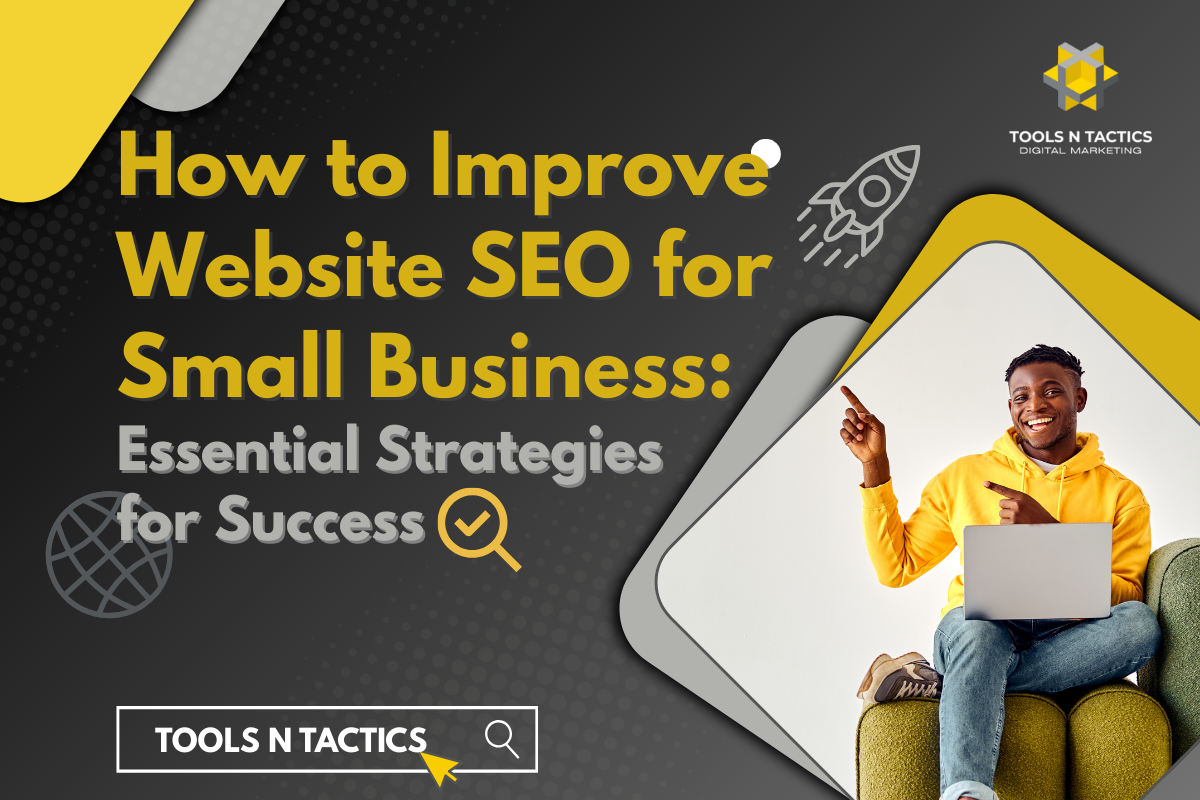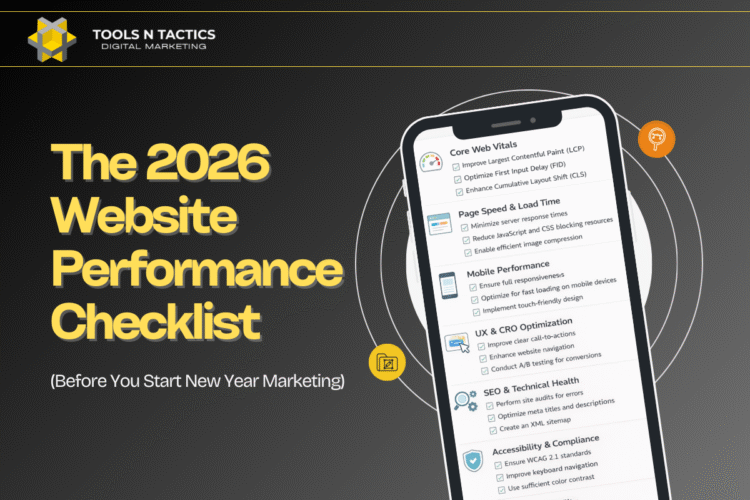

Improve website SEO to boost your online visibility, attract the right customers, and grow your business in 2025. By implementing targeted SEO strategies, you can attract potential customers actively searching for your products or services. A well-optimized website not only drives traffic but also enhances the user experience, ultimately leading to higher conversion rates.
To start, focus on keyword research to identify terms that resonate with your audience. Combining this with on-page optimization, such as crafting quality content and improving site speed, ensures that your website meets both user and search engine expectations. Local SEO also plays a vital role; optimizing your presence on platforms like Google My Business can enhance your visibility in local searches.
As you delve into your SEO journey, remember that consistency is key. Regularly updating your content and monitoring analytics will help you refine your strategies over time. Equip yourself with the right tools and techniques to ensure your small business thrives in the digital space.


Understanding Small Business SEO Fundamentals
To improve your online presence, grasping the fundamentals of small business SEO is essential. This includes defining what small business SEO entails, understanding its significance for your growth, and distinguishing between general SEO and local SEO.
What Is Small Business SEO?
Small business SEO refers to the process of optimizing your website to enhance its visibility on search engines. This strategy encompasses various techniques, focusing on improving search engine rankings to attract organic traffic. Effective small business SEO involves keyword research, on-page optimization, technical adjustments, and continuous content updates.
By targeting relevant keywords relevant to your offerings, you can position your website higher on search result pages. This can lead to increased brand awareness, helping potential customers find your business easily. As a small business owner, investing in SEO practices is critical to ensuring your website serves as a powerful marketing tool.
Why SEO Is Crucial for Small Businesses
SEO is vital for small businesses because it directly impacts visibility and customer acquisition. When your website ranks higher on search engines, it becomes more accessible to potential customers actively searching for your products or services. Increased online visibility translates to more organic traffic, further enhancing brand awareness and credibility.
Moreover, SEO helps you compete with larger companies. Small businesses can leverage tailored SEO strategies to target niche markets effectively. By optimizing your site, you gain valuable insights into customer behavior, allowing for better alignment of your offerings with their needs. In today’s digital marketplace, neglecting SEO can hinder your growth and branding efforts.
SEO vs. Local SEO: Core Differences
Understanding the distinction between SEO and local SEO is crucial for your online strategy. While SEO encompasses all tactics used to enhance the overall visibility of your website, local SEO focuses specifically on optimizing your online presence for geographic relevance.
For small businesses, local SEO is particularly important. It helps you appear in local search results when potential customers search for services in your area. Techniques include optimizing your Google My Business listing, accumulating local reviews, and incorporating location-specific keywords into your content.
By emphasizing local SEO, you can effectively attract customers seeking services nearby, ultimately driving foot traffic and conversions to your business.
Setting Up for SEO Success
Establishing a solid foundation for SEO is essential for improving your website’s visibility and attracting the right audience. Focus on defining clear goals, utilizing effective tools, and conducting thorough audits to ensure your strategy is data-driven.
Choosing SEO Goals and Metrics
Begin by defining specific SEO goals tailored to your business objectives. Consider what you want to achieve: increased website traffic, improved conversion rates, or enhanced brand visibility. Key performance indicators (KPIs) such as organic traffic growth, bounce rate, and conversion rates from organic searches will help you measure success.
Utilize Google Analytics to track user behavior and monitor your progress. Set measurable targets for each goal, which provides a clear focus for your SEO efforts. Having well-defined metrics allows for continuous evaluation, enabling adjustments to your strategy as needed.
Configuring Essential SEO Tools
To effectively manage your SEO efforts, configure essential tools such as Google Search Console (GSC) and Google Analytics. GSC provides insights into how your site is performing in search results, allowing you to identify and resolve issues affecting your ranking.
Set up your GSC account by verifying your website and submitting a sitemap. This ensures that Google can efficiently crawl and index your site. Meanwhile, Google Analytics tracks user engagement, conversions, and target achievements. Regularly review the data to assess performance and refine your SEO strategy based on real-time insights.
Conducting an SEO Audit
An SEO audit is crucial for assessing your website’s current performance and identifying areas for improvement. Start by analyzing on-page elements like title tags, meta descriptions, and keyword usage to ensure they align with your target keywords.
Also, evaluate your website’s technical aspects, such as loading speed and mobile responsiveness. Tools like SEMrush or Ahrefs can assist in this process. Pay attention to backlinks, as quality links from reputable sites enhance your domain authority and search rankings. Conducting regular audits helps you stay aligned with your SEO goals and adapt to changes in search engine algorithms.


Keyword Research and Search Intent
Keyword research is the foundation of any effective SEO strategy. Understanding which keywords to target will direct traffic to your website and connect you with potential customers. To maximize impact, you need to dive into identifying the right keywords, grasping search intent, evaluating keyword difficulty, and leveraging long-tail keywords.
Identifying Target Keywords
Start by using keyword research tools like SEMrush, Ahrefs, or Google Keyword Planner. These platforms help you discover keywords relevant to your business. Input topics related to your industry to generate a list of potential keywords.
Focus on a mix of short-tail and long-tail keywords. Short-tail keywords are broad and often high-volume, while long-tail keywords are more specific and usually indicate a stronger purchase intent. For example, “shoes” versus “best running shoes for flat feet.” Aim to create a list of target keywords that represent your product or service effectively.
Understanding Search Intent
Search intent refers to the reason behind a user’s search query. It usually falls into three categories: informational, navigational, or transactional.
- Informational: Users seek knowledge (e.g., “how to improve website SEO”).
- Navigational: Users look for a specific site (e.g., “Facebook login”).
- Transactional: Users intend to purchase (e.g., “buy running shoes online”).
Identifying search intent will help you tailor your content to meet user needs. Ensure your website content provides answers relevant to those search queries, enhancing user experience and improving your ranking on Search Engine Results Pages (SERPs).
Evaluating Keyword Difficulty and Search Volume
Understanding keyword difficulty and search volume is crucial for effective keyword selection. Keyword difficulty indicates how challenging it will be to rank for a specific term. Tools like Ahrefs can provide this metric.
Search volume shows how often a keyword is searched. High search volume keywords may attract more traffic, but they often come with high competition.
You’ll want to balance these metrics. Target some moderate-difficulty keywords with decent search volume, as they may offer a better chance to rank and attract valuable traffic to your site.
Leveraging Long-Tail Keywords
Long-tail keywords are crucial for your SEO strategy because they target specific queries and have lower competition. These keywords are typically three words or more in length.
For example, instead of targeting “SEO,” consider “affordable SEO services for small businesses.” This specificity captures a narrower audience but tends to attract users who are closer to making a purchasing decision.
Incorporate long-tail keywords naturally into your website content, including titles, headings, and meta descriptions. Leveraging these keywords allows you to enhance relevancy while catering directly to the search intent of potential customers.
Optimizing On-Page SEO Elements
To enhance your small business’s online presence, focusing on on-page SEO elements is crucial. This involves improving key aspects of your website so that search engines can effectively understand and rank your content higher. The following strategies will help elevate your SEO performance.
Crafting High-Quality Content
Creating high-quality content is essential for attracting and retaining visitors. Your content should be valuable, informative, and relevant to your audience. Use clear language and answer common questions within your niche. Incorporate keywords naturally to improve searchability, but avoid keyword stuffing, which can harm your rankings.
Engaging content formats like blog posts, infographics, and videos can also enhance user experience. Remember to update your content regularly to keep it fresh and relevant. Quality content naturally earns backlinks, further boosting your site’s authority and visibility.
Optimizing Title Tags and Meta Descriptions
Title tags and meta descriptions play a significant role in on-page SEO. The title tag should include your primary keyword and summarize the page’s content effectively. Keeping it under 60 characters ensures it displays correctly in search results.
Meta descriptions, while not a ranking factor, influence your click-through rates. Aim for concise, compelling descriptions around 150 characters that entice users to click. Utilizing action words can motivate potential visitors to engage with your content.
Implementing Header Structure and Internal Linking
Using a proper header structure is important for both readability and SEO. Start with an H1 tag for your main title, followed by H2 and H3 tags for subheadings. This hierarchy helps search engines understand your content’s layout and relevance.
Internal linking is equally vital. It not only guides readers to related content but also assists search engines in crawling your site more effectively. Use descriptive anchor text for links, as it gives context to both users and search engines about the page being linked.
Addressing URL Structure and Canonicalization
A clean URL structure enhances user experience and SEO. Ensure that your URLs are descriptive, concise, and incorporate relevant keywords. Avoid using complex parameters, as they can confuse both users and search engines.
Implement canonical tags to prevent duplicate content issues. This helps search engines understand the preferred version of a page, ensuring that your content is credited properly. Consistent practices in managing URLs and canonicalization can significantly elevate your site’s search engine performance.
Technical SEO for Small Businesses
Focusing on technical SEO is essential for enhancing your website’s visibility and performance. Key areas such as crawlability, site speed, and structured data can significantly impact how search engines and users experience your site.
Ensuring Crawlability and Indexing
To improve crawlability, ensure that your website can be easily accessed by search engines. Start with a well-configured robots.txt file that specifies which parts of your site should be crawled and which should be blocked. This helps prevent indexing of duplicate content or irrelevant pages.
Additionally, create an XML sitemap to guide search engines through your site’s structure. Submit this sitemap to platforms like Google Search Console. This will aid in faster indexing of your new content. Regularly audit your site to fix crawl errors, ensuring that search engines can reliably index your pages.
Improving Site Speed and Mobile Optimization
Fast-loading websites are crucial for a positive user experience and better rankings. Use tools like Google PageSpeed Insights to identify speed issues. Optimize images and use browser caching to enhance performance. Switching to an SSL certificate and ensuring your site uses HTTPS can also improve load times and security, enhancing user trust.
With Google’s focus on mobile-first indexing, it’s vital to ensure your site is mobile-friendly. A responsive design will adjust seamlessly to various screen sizes. This not only supports usability but also plays a significant role in reducing bounce rates and retaining visitors.
Implementing Structured Data and Schema Markup
Utilizing structured data and schema markup can significantly improve your visibility in search results. This markup helps search engines understand your content better, leading to enhanced rich snippets in search listings.
Focus on adding schema for products, reviews, and local business information. This makes your site more informative and appealing to potential customers. Testing your schema implementation with tools from Google will ensure everything works correctly. Monitoring your visibility and interactions can offer valuable insights into how structured data impacts your performance.
Local SEO and Online Reputation
Enhancing your local SEO strategy significantly contributes to your online reputation. Key components include optimizing your Google Business Profile, ensuring your business is listed in relevant online directories, and effectively managing customer reviews.
Optimizing Google Business Profile
Your Google Business Profile is crucial for local SEO. Ensure that all information, such as address, phone number, and business hours, is accurate and up-to-date. Use high-quality images to represent your business and showcase what you offer.
Encourage customers to interact with your profile by posting updates, responding to questions, and posting promotions. This engagement signals to Google that your business is active, improving your rankings in local search results. Moreover, incorporating relevant keywords in your business description will help you attract searches pertinent to your services.
Getting Listed in Local Directories
Listing your business in local online directories can elevate your visibility. Focus on reputable directories like Yelp and local chamber of commerce sites. Consistency is key; ensure that your NAP (Name, Address, Phone number) details are the same across all platforms.
This consistency builds trust with search engines and helps potential customers find you easily. Additionally, localized keywords in your directory listings can enhance your chances of emerging in local search results, driving more foot traffic to your establishment.
Collecting and Managing Customer Reviews
Customer reviews play a vital role in shaping your online reputation. Actively encourage satisfied customers to leave reviews on your Google Business Profile and other platforms like Yelp. These reviews not only influence potential customers but also impact your local search rankings.
Monitor your reviews regularly, responding promptly to both positive and negative feedback. Acknowledging positive reviews fosters goodwill, while addressing negatives can showcase your commitment to customer service. This proactive management helps maintain a favorable online presence, reinforcing your reputation as a reliable business in your community.
Frequently Asked Questions
Addressing common inquiries can clarify aspects of SEO specific to small businesses. Exploring these topics helps you understand key strategies to enhance your website’s performance and visibility in search engines.
What are the best SEO practices for improving a small business website’s ranking on search engines?
Optimizing your small business website involves several key practices. Focus on using relevant keywords naturally throughout your content, ensuring your website has a user-friendly design, and improving page load speeds. Consistent, high-quality content that addresses user needs can also significantly boost your search rankings.
How can creating high-quality content enhance SEO for a small business website?
High-quality content serves multiple purposes. It attracts visitors and keeps them engaged on your site. This engagement signals to search engines that your website is valuable, potentially improving your rankings. Incorporating relevant keywords and addressing your audience’s questions can enhance this effect.
What role do keywords play in optimizing a small business website for search engines?
Keywords are essential for SEO because they connect user searches with your content. Identify and use relevant keywords that your target audience is searching for in your web copy, titles, and meta descriptions. Effective keyword placement can help your website appear more often in search results.
How important is mobile optimization for a small business website’s SEO strategy?
Mobile optimization is crucial as search engine algorithms prioritize mobile-friendly websites. A significant portion of online traffic comes from mobile devices. Ensuring your site is responsive and easy to navigate on mobile can improve user experience and boost your rankings.
Can social media presence impact the SEO of a small business website, and how?
Yes, an active social media presence can positively impact your website’s SEO. Sharing your content on social platforms increases visibility and can lead to more backlinks. Engaging with your audience on social media helps to build brand awareness, indirectly benefiting your search engine rankings.
What are the most effective link-building techniques for a small business website to improve its SEO?
Link-building can be achieved through various strategies. Guest blogging on relevant sites, partnerships with local businesses, and leveraging social media content can secure valuable backlinks. These referrals enhance your site’s authority and can lead to improved search engine rankings, driving more organic traffic to your site.
Ready to grow your small business with SEO? Contact Tools N Tactics today and start ranking higher, driving traffic, and converting more customers.



